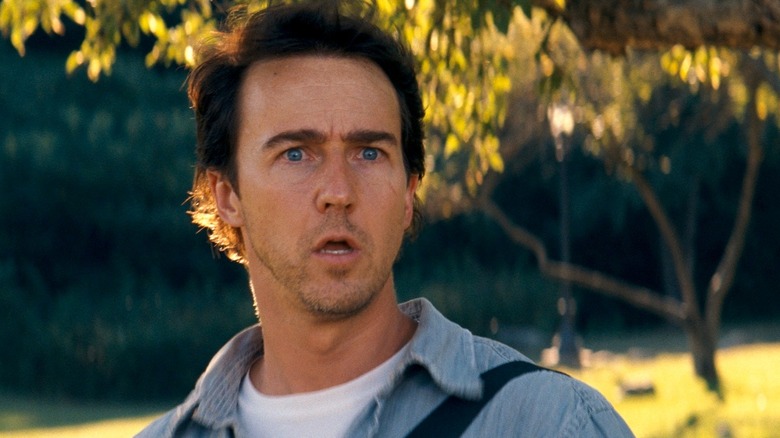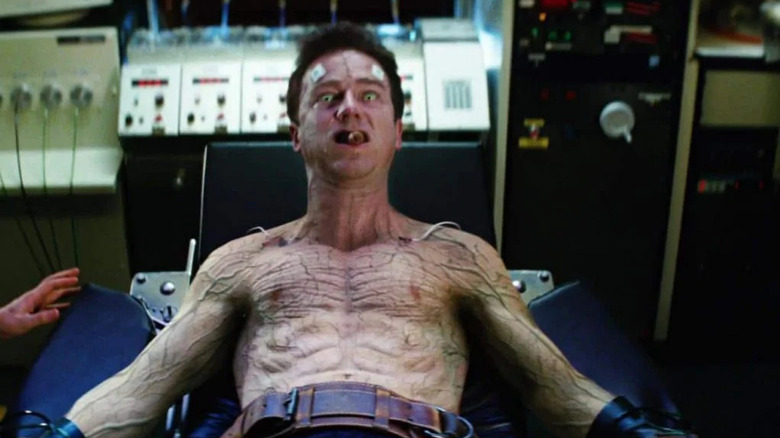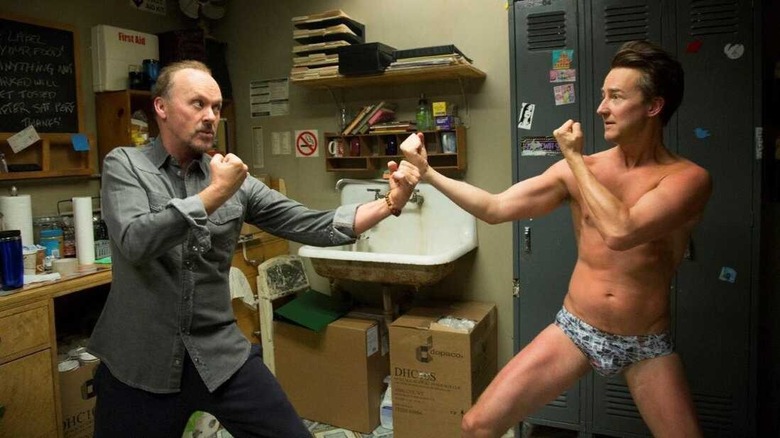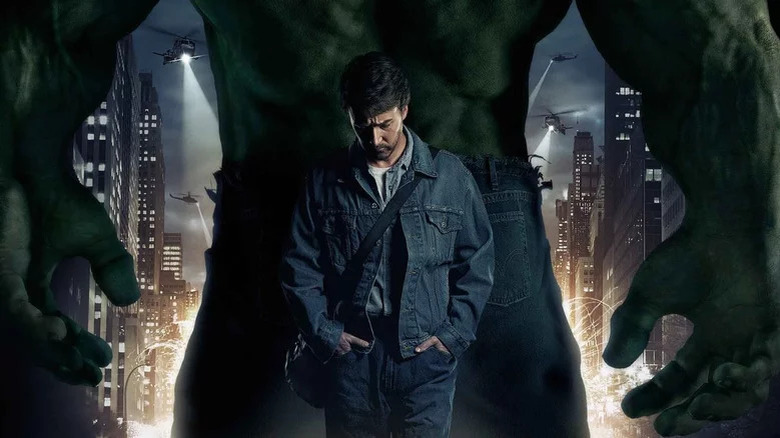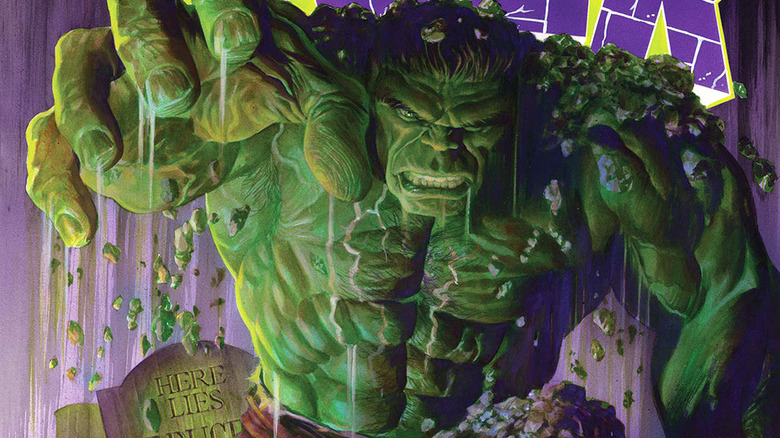Marvel Instituted An MCU-Wide Rule After Working With Edward Norton
"The Incredible Hulk" was an early stumbling block for the Marvel Cinematic Universe. Released in June 2008, a mere month after "Iron Man," lightning did not strike twice for Marvel Studios' burgeoning movie enterprise; "Incredible Hulk" got a shrug from critics and underperformed at the box office.
Even so, Marvel Studios steamrolled ahead. Star Edward Norton didn't return for any future MCU films and Bruce Banner was recast with Mark Ruffalo for "The Avengers." The behind-the-scenes book "MCU: The Reign of Marvel Studios" by Dave Gonzales, Gavin Edwards, and Joanna Robinson features a chapter about "The Incredible Hulk" and its gamma radiation-flavored fallout. The book ultimately puts the production's unpleasant memories on the shoulders of Edward Norton, suggesting his actor-as-auteur approach solidified Marvel's top-down filmmaking tactics.
An unnamed "Marvel performer" tells the authors, "We have a no-a**hole policy on our movies," and the book traces this policy back to Norton's behavior. The book then quotes producer Craig Kyle, who says, "It's a great policy."
I don't think this is the only takeaway from the story, though.
Norton's Hulk
It was well known even before "MCU" hit bookstore shelves that Edward Norton wanted a great amount of control over "The Incredible Hulk" — /Film chronicled the behind-the-scenes drama back in 2008. As Norton would tell CinemaBlend in 2019, he saw the character as a "Promethean myth" and wanted to make a trilogy in the vein of "The Dark Knight."
"MCU" details Norton's demands. For instance, he rewrote credited writer Zak Penn's script (though the book suggests this was more of a new coat of paint than an overhaul, if only because the action beats were locked in). He also wanted to play both Banner and the Hulk for a more complete performance (even if he ultimately "wasn't really engaged" in the motion-capture process, per stuntman Terry Notary). The book likewise describes director Louis Leterrier as having been deferential to Norton on set. Marvel was initially happy to give Norton the reins but found themselves underwhelmed by his "ponderous" 135-minute cut.
So, over Norton's "loud" objections (especially since he'd been upfront about how much control he'd wanted and Marvel had initially promised him it) the movie was cut into a 112-minute action flick. Leterrier was included in the final cut by Marvel Studios President Kevin Feige, but Norton was not. Reportedly, Feige still holds a grudge for Norton's conduct; he and "Avengers" director Joss Whedon are the only MCU alums on Feige's "do not call" list.
How does Norton remember the experience? During a Comedy Central roast of Bruce Willis, he said: "I thought we should try to make one Marvel movie that was as good as the worst Chris Nolan movie, but what the hell was I thinking?"
Who's the real a-hole?
Even outside "Hulk," Norton has a reputation as being difficult to work with. Why? Because he cares a lot about creative control. He took final cut of "American History X" away from director Tony Kaye, who disowned the resulting movie. Brian Cox, who worked together with Norton on Spike Lee's "25th Hour," writes in his memoir, "Putting the Rabbit in the Hat," that "[Norton is] a nice lad but a bit of a pain in the arse because he fancies himself as a writer-director." In 2014's "Birdman," Norton self-deprecatingly plays an egotistical actor who tries to seize control of a theater production.
So yeah, Norton being a demanding presence and making few friends on the set of "The Incredible Hulk"? I buy that. But the passage in "MCU" which proclaims, "['The Incredible Hulk'] also taught Marvel Studios a valuable early lesson about the limits of collaboration. Put another way, Marvel learned that top-down authority and creativity are not necessarily in conflict with each other"? It makes me roll my eyes.
I don't want to discredit the reporting of "MCU." It's well-researched and pulls from plenty of primary sources. However, reporting isn't just repeating the facts, it's how you frame them. The authors of "MCU" admit they're in the bag for Marvel Studios and Feige's vision of producer-centered filmmaking. They write, "The Marvel method could have ended up as an assembly line, but as with the old studio system, it has resulted in a mix of entertaining diversions and inarguable masterpieces."
As a result, the book frames Marvel Studios' practices more positively than others might (see this Twitter thread by film critic Nicole Veneto). I think turning Norton into the villain of "The Incredible Hulk" is an example of that.
Filmmaking factory
I'd say the more apt comparison for how Marvel Studios makes their movies is not the Hollywood studio system, but Stan Lee's "Marvel method" of making comics (where the artists did most of the work, going off of vague ideas from Lee, then they split credit as supposedly equal creative partners). As "MCU" admits, previsual development is where Marvel Studios' movies are first made, sometimes before films even have a director. Commercialism and homogeneity rule the game in this mode; there's no other way to release movies at the relentless speed Marvel Studios does.
Marvel Studios has built a conveyor belt factory system that would make Henry Ford proud and this process fundamentally devalues directors, much less upstart actors, as artists. If you turn a filmmaker into a cog in a machine, you sap the things that make movies worth watching; passion, creativity, and unique aesthetics.
"MCU" makes Norton into the fall guy, suggesting his handling of "The Incredible Hulk" proves why Marvel Studios has to keep a tight leash on the creatives, with the implicit argument that the results are worth it. Are they though? As Martin Scorsese has argued, we're living in the most risk-averse period of Hollywood filmmaking ever.
Norton's experience isn't an isolated one either. Mickey Rourke, who played the villainous Ivan Vanko in "Iron Man 2," shared his negative thoughts on the finished film (cited in the book): "Marvel just wanted a one-dimensional bad guy, so most of the performance ended up [on] the floor." Nia DaCosta, director of "The Marvels" and a talented filmmaker ("Candyman" wasn't my jam but "Little Woods" is a gripping drama), admits her MCU film was at heart "a Kevin Feige production." And yet, now Disney is throwing her under the bus after "The Marvels" bombed.
A better Hulk
To head off any accusations of me being a "hater," let me stress I do like Marvel — the characters and the comics, specifically. My dissatisfaction is because I've realized these movies are the safest, least interesting interpretations of these characters (I sign off on almost every word of Mike Shutt's summation for /Film of how the "Spider-Verse" films defy this).
So, I'll highlight a comic that is the kind of Hulk story it sounds like Edward Norton wanted to make: "Immortal Hulk" by Al Ewing and Joe Bennett. "Immortal Hulk" is the kind of Marvel comic you get when there's an artist with loftier ambitions than brand preservation. It mixes David Cronenberg-style body horror, disaster capitalism screeds right out of Naomi Klein's "The Shock Doctrine," and Kabbalistic mythology into a delicious stew. The main ingredient is Bruce Banner's fractured mind; a recurring refrain is whether the Hulk is "Geburah or Golachab" (Kabbalistic notions of good and evil).
If you count yourself an MCU fan, read this comic; I promise you'll realize the true potential the stories of the Marvel Universe can hold within its pages. Ewing is spinning gold again on his currently-running "Immortal Thor" too. Marvel Comics has plenty of problems with corrupting corporate influence too, but artists can spread their wings in ways they're never permitted to on the MCU's films.
From the internal ramifications of his actions, you'd think Norton had done much worse on "The Incredible Hulk" set than butt heads with Kevin Feige. When you consider the whole context, this "no a-holes" rule reads more like "no one who will challenge the Marvel machine."
Praising company men as visionaries and disparaging ambition is a path toward conformity, not greatness.
